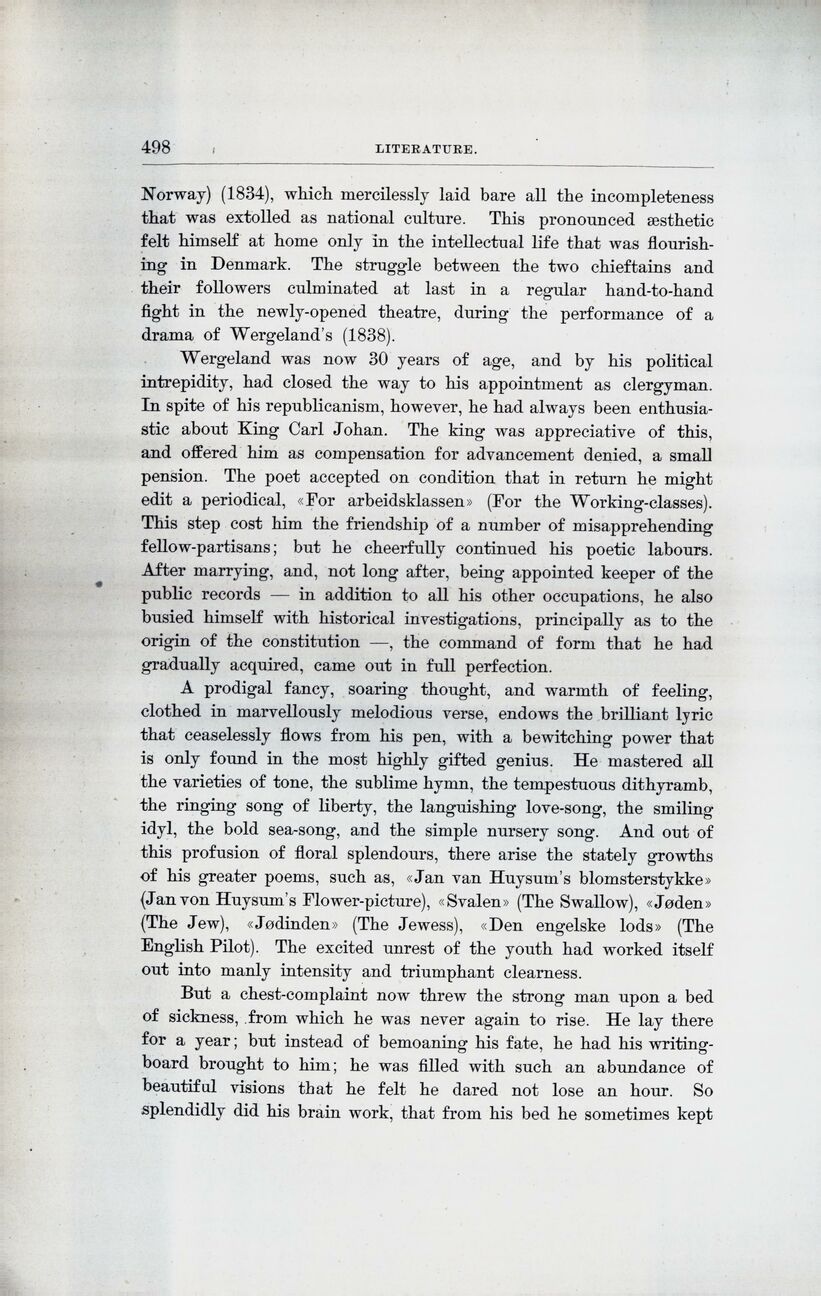
Full resolution (JPEG) - On this page / på denna sida - Literature, by Chr. Brinchmann

<< prev. page << föreg. sida << >> nästa sida >> next page >>
Below is the raw OCR text
from the above scanned image.
Do you see an error? Proofread the page now!
Här nedan syns maskintolkade texten från faksimilbilden ovan.
Ser du något fel? Korrekturläs sidan nu!
This page has been proofread at least once.
(diff)
(history)
Denna sida har korrekturlästs minst en gång.
(skillnad)
(historik)
Norway) (1834), which mercilessly laid bare all the incompleteness
that was extolled as national culture. This pronounced æsthetic
felt himself at home only in the intellectual life that was
flourishing in Denmark. The struggle between the two chieftains and
their followers culminated at last in a regular hand-to-hand
fight in the newly-opened theatre, during the performance of a
drama of Wergeland’s (1838).
Wergeland was now 30 years of age, and by his political
intrepidity, had closed the way to his appointment as clergyman.
In spite of his republicanism, however, he had always been
enthusiastic about King Carl Johan. The king was appreciative of this,
and offered him as compensation for advancement denied, a small
pension. The poet accepted on condition that in return he might
edit a periodical, «For arbeidsklassen» (For the Working-classes).
This step cost him the friendship of a number of misapprehending
fellow-partisans; but he cheerfully continued his poetic labours.
After marrying, and, not long after, being appointed keeper of the
public records — in addition to all his other occupations, he also
busied himself with historical investigations, principally as to the
origin of the constitution —, the command of form that he had
gradually acquired, came out in full perfection.
A prodigal fancy, soaring thought, and warmth of feeling,
clothed in marvellously melodious verse, endows the brilliant lyric
that ceaselessly flows from his pen, with a bewitching power that
is only found in the most highly gifted genius. He mastered all
the varieties of tone, the sublime hymn, the tempestuous dithyramb,
the ringing song of liberty, the languishing love-song, the smiling
idyl, the bold sea-song, and the simple nursery song. And out of
this profusion of floral splendours, there arise the stately growths
of his greater poems, such as, Jan van Huysum’s blomsterstykke»
{Jan von Huysum’s Flower-picture), «Svalen» (The Swallow), «Jøden»
(The Jew), «Jødinden» (The Jewess), «Den engelske lods» (The
English Pilot). The excited unrest of the youth had worked itself
out into manly intensity and triumphant clearness.
But a chest-complaint now threw the strong man upon a bed
of sickness, from which he was never again to rise. He lay there
for a year; but instead of bemoaning his fate, he had his
writing-board [[** sjk]] brought to him; he was filled with such an abundance of
beautiful visions that he felt he dared not lose an hour. So
splendidly did his brain work, that from his bed he sometimes kept
<< prev. page << föreg. sida << >> nästa sida >> next page >>